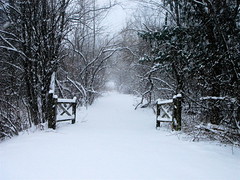Third Floor at the Library
I
I discovered the warmth of the Concord Library and the two tables on the third floor two weeks ago. An entire upper floor devoted to the 600s and 700s hides an enclave for the writer who wants solitude. I am sitting on a faux green leather chair--to my right an open space looks down upon a reading lounge--to my left a six shelf stack of books the length of the room. I've selected the seat closest to the stacks and away from the view of anyone in the lounge. A woman passes, looks my way and then hurries on to the furthest reaches of the third floor. By the time the architects arrived on the upper floor they settled for a plain plan with pipes painted the same white as the walls. I am seated under a water sprinkler.
II
The Boston Public Library exudes confidence in its collection and public service. Yet an old woman died in the library when she wandered away from a group and opened a door, entered a hallway, perhaps closet, perhaps the entrance to a warren of hallways, and could not open the door back to the starting place. It is said that the people she knew looked for her inside the library and then beyond the library. She was forgetful and probably wandered away. I guess there are many doors leading to rarely used places in the library because she wasn't found for days or was it weeks. In time someone opened the door to her self imposed catacomb, notified her relatives, and suggested some alterations to the Boston Public Library. Is that a true story or an urban myth?
III
Two lions protect the New York Public Library.
They’re a common meeting place, "I'll meet you in front of the lion."
Many of the books, when I went to college in New York City, remained in stacks away from greasy, sweaty, or oily hands and away from the fiend who tore pages out and left with the purloined pages in a backpack or under a shirt. The collection was so vast that allowing everyone to roam unassisted might create turmoil in the stacks. I remember filling out request slips, handing them in and then waiting patiently. One day I waited for twenty minutes before approaching the desk. "The book you’re looking for," said the librarian, "is gone." What does gone mean? Did someone else have that tome or was it something far worse.
III
Because I was in Salem for the day and had seen the usual tourist attractions I sought something off beat. I ended up at a library that housed some of the original depositions used in the Salem witch trials. I identified myself as a writer interested in writing about Rebecca Nurse--one of the women accused of being a witch. After producing a number two pencil and a yellow pad and listening to the instructions for handling the document, I was escorted to a large polished mahogany table. A huge book was brought to the table and opened to the depositions against Rebecca. I recall the sepia colored ink and the handwriting that defied my ability to read more than a few words per line, but enough to fear for Rebecca--for the volume of words against these women threw me back to those times.
IV
Libraries reflect the tastes of those who purchase the books. My home library has a vast collection of graphic novels and the history of the early comic book artists. The head librarian's particular expertise is the graphic novel and its place in history. I recall that comic books weren't banned in my home, but they weren't given a stamp of approval. Yet when I had an illness that kept me in bed for several weeks my parents purchased comic books because I couldn't read for any length of time. Besides the heroes and heroines of the comics became part of my fantasy play. But it was the book I had borrowed from the local library that supplied most of my role-playing stories --Nobody's Boy and Nobody's Girl. The librarian had suggested those two books.
V
The librarian passes by with her rolling cart and the books to be shelved. I imagine a book sitting on a shelf for years with no takers, no one to peruse the words an author wrote hoping for an audience—the plot of a tragedy.
IV
The library is also the place that encourages subterfuge. My bottle of water, wrapped in a plastic bag from Shaw's Grocery, is hidden in my purple backpack. I sip water when I don't hear footfalls.





